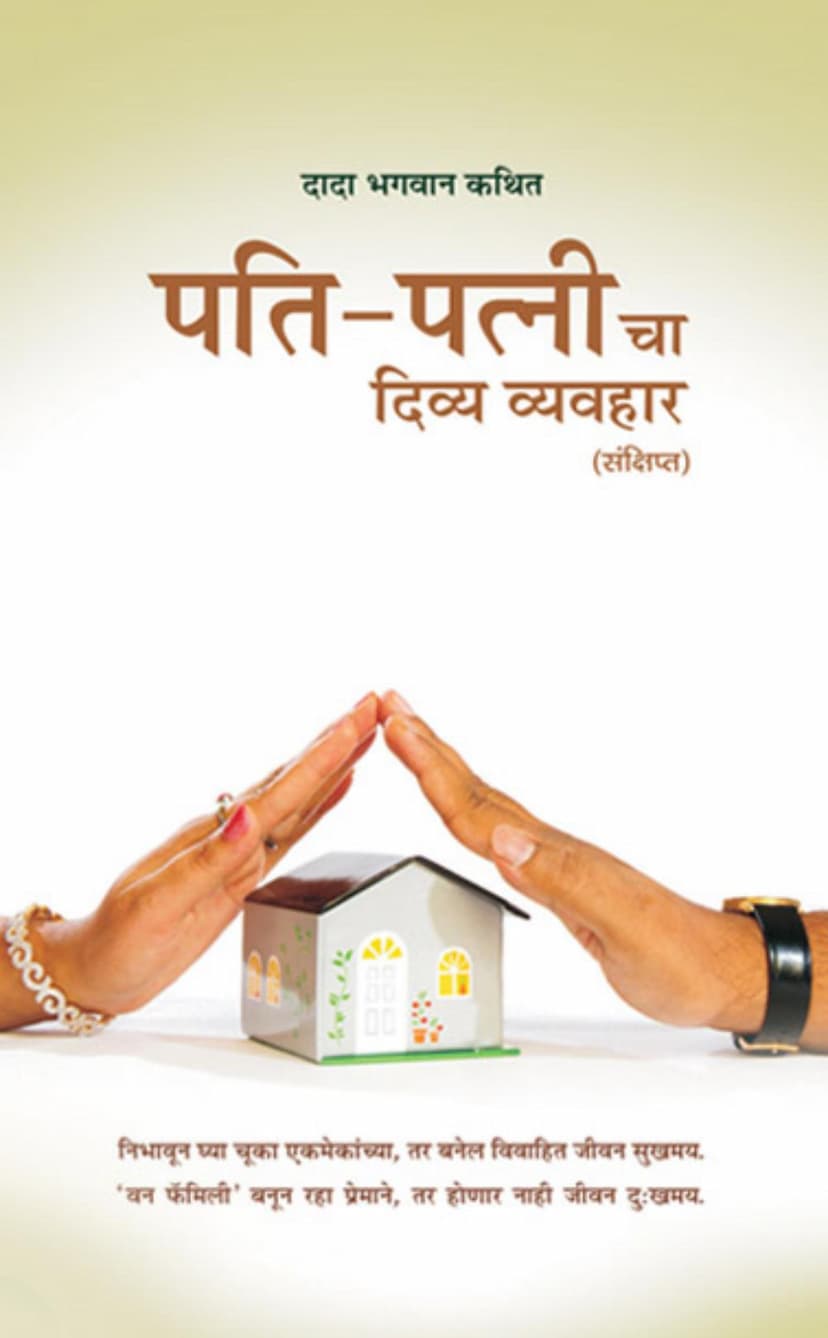Pati Patnicha Divya Vyavhar
Added to library: September 2, 2025

Summary
Here's a comprehensive summary of the Jain text "Pati Patnicha Divya Vyavhar" (The Divine Conduct of Husband and Wife) by Dada Bhagwan, based on the provided pages:
Core Message:
The book, "Pati Patnicha Divya Vyavhar," is a concise collection of the teachings of Param Pujya Dadashri (Gnanacharya Shree Ambalal M. Patel, known as Dada Bhagwan) on the subject of marital harmony and a divine relationship between husband and wife. The central theme is that a happy married life is achieved through mutual understanding, forgiveness, and a spirit of oneness, rather than focusing on faults or ownership. The teachings emphasize practical wisdom rooted in spiritual science, aiming to resolve conflicts and foster mutual respect and love.
Key Concepts and Advice:
-
"One Family" (Ek Kutumb): The fundamental principle is to live as a single, loving family unit, free from internal disputes. This requires adjustment and understanding within the home. The book critiques the lack of family organization and the tendency to create conflict over minor issues (like salty dal).
-
Resolving Conflicts (Klesh/Bhandan):
- Avoid Clashes: Clashes and arguments are detrimental to peace and divine presence. The text states that where there is conflict, God does not reside.
- Understanding the Root: Conflicts often stem from ignorance (Agnanta), ego (Ahankar), and not seeing the underlying reality of karmic accounts.
- Managing Anger: When one partner is angry, the other should remain calm and not retaliate. This prevents escalation. The analogy of a hot engine needing to be cooled is used.
- Forgiveness and Adjustment: Minor mistakes should be overlooked and forgiven. The essence of a happy life is to adjust with everyone, everywhere.
- Preventing Escalation: Small issues can become major conflicts if not handled with wisdom. For example, if a dish breaks, the focus should be on whether the person is hurt, not on blaming.
-
Understanding Each Other's Nature:
- "You are correct from your viewpoint": This principle from Dada Bhagwan's teachings is crucial. Recognizing that each person has their own perspective, even if it seems wrong to you, is key to avoiding disputes.
- Acceptance, Not Correction: Instead of trying to change the spouse, one should strive to understand and accept them as they are. Correction can lead to resistance and further conflict.
- The "Two Departments": Men and women have separate domains. Men should not interfere in household matters (like kitchen management), and women should not interfere in men's work outside the home, unless asked. This division fosters harmony.
-
The Nature of Love:
- True Love vs. Attachment: True love is unwavering and does not fluctuate based on external factors (like gifts). Attachment (Moksha/Asakti) based on material possessions or perceived benefits is not true love and leads to suffering.
- Selfless Love: Love without self-interest, where there is no "mine" or "yours," is pure love. This state is achieved through self-knowledge.
- Respect and Companionship: Marriage is described as a partnership or companionship rather than ownership. Treating each other as partners fosters a healthier dynamic.
-
Addressing Specific Issues:
- Criticism: Pointing out faults that the spouse is already aware of is unproductive and hurtful. Only point out faults that the other person is unaware of and does so with a benevolent intent.
- Possessiveness ("My-ness"): The ego of "mine" and "yours" creates conflict. Repeating "not mine, not mine" helps to dissolve this attachment.
- Doubt: Doubt destroys relationships. Striving for a state of doubtlessness is essential.
- Communication: Open and respectful communication is vital. If there is a misunderstanding, it should be cleared through dialogue, not by holding onto grudges or silence.
- Parental Influence: The advice is to manage relationships with in-laws with wisdom, ensuring harmony.
- Husband's Role: Husbands are advised to be the "owners" of the responsibility, not the "ownership" itself. They should be understanding, forgiving, and avoid unnecessary interference. They are encouraged to be "Devas" (god-like) in their dealings.
- Wife's Role: Wives are encouraged to be understanding, forgiving, and to maintain their purity and respect. They are seen as the foundation of the home and a source of strength.
- Children's Impact: Marital conflicts negatively affect children, shaping their future behavior.
- Divorce: Divorce is generally discouraged, especially after having children. The emphasis is on finding ways to adjust and make the marriage work, as finding a better partner is not guaranteed.
- Sexual Desire (Vishayvikar): While acknowledging its existence, the teachings advise restraint and control. Excess is harmful and leads to karmic entanglements. The ideal is to satisfy needs within marriage, without causing discord or harm.
- Sacrifice and Forgiveness: Mutual sacrifice and the willingness to let go of grievances are presented as essential.
- Spiritual Foundation: The ultimate goal is spiritual liberation. While worldly interactions are necessary, they should be performed with detachment, as if acting in a play.
Dada Bhagwan's Approach:
- "Akram Gnan" (Non-step Enlightenment): Dada Bhagwan's teachings are described as an "elevator path" or "shortcut" to self-realization. He helped people attain self-knowledge within hours through a spiritual process called "Gnan Vidhi."
- Practical Wisdom: The teachings are highly practical, addressing everyday marital issues with simple, direct solutions.
- Focus on the Self: The ultimate responsibility for harmony lies within oneself. The teachings guide individuals to purify their own perspectives and reactions, rather than trying to change the other person.
- Compassion and Non-Judgment: Dada Bhagwan's approach is compassionate. He never judged individuals but rather explained the principles of life and karma.
- Humor and Directness: The language used is often direct, sometimes humorous, and relatable, making complex spiritual concepts accessible.
Publisher and Translator:
The book is published by Dada Bhagwan Aradhana Trust. The original Gujarati compilation is by Dr. Neeruben Amin, and the Marathi translation is by Mahatma Ganan.
In essence, "Pati Patnicha Divya Vyavhar" offers a transformative perspective on marriage, guiding couples towards a relationship filled with love, respect, and spiritual growth by understanding the underlying spiritual laws and applying practical, self-purifying techniques.